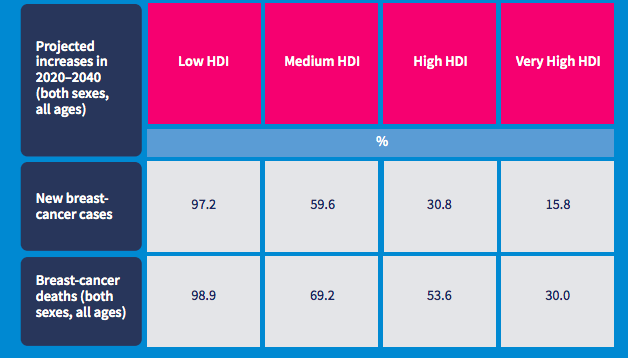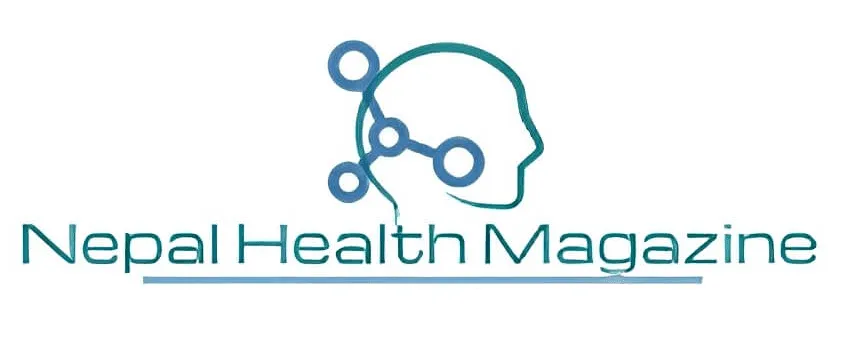The Global Breast Cancer Initiative | WHO :Breast cancer is the most common cancer worldwide and the leading cause of cancer deaths among women, disproportionately affecting low- and middle-income countries. The Global Breast Cancer Initiative strives to reduce breast cancer mortality by 2.5 percent per year, which over a 20-year period can save 2.5 million lives. The purpose of this core technical package is to outline a pathway for incremental, sustainable improvements tailored to country-specific needs based on three key strategies and objectives: health promotion for early detection; timely diagnosis; and comprehensive breast cancer management. This document provides a common framework linking policy makers, stakeholders, the clinical community, program managers and civil society to evidence-based systematic approaches that can facilitate health systems strengthening and reduce inequities in women’s health throughout their life cycles.
The Global Breast Cancer Initiative | WHO : Breast cancer—the most common cancer worldwide and leading cause of cancer death among women—disproportionately affects individuals in low- and middle-income countries. Breast cancer five-year survival rates in high-income countries exceed 90%, compared with 66% in India and 40% in South Africa.Bridging inequities in breast cancer outcomes requires systematic improvements in access to resource-appropriate and quality services. The World Health Organization’s Global Breast Cancer Initiative (GBCI), established in 2021, brings together stakeholders from around the world and across sectors with the shared goal of reducing breast cancer by 2.5 percent per year, which over a 20 year period would save 2.5 million lives.
GBCI employs three key strategies to achieve these objectives: health promotion and early detection; timely diagnosis; and comprehensive breast cancer management. Through GBCI, WHO provides guidance to governments across the world on ways to strengthen systems for detecting, diagnosing and treating breast cancer, to further their capacities to manage other types of cancer.

from breast cancer based on country classification, using the
United Nations Human Development Index (HDI), 2020–2040
Breast-cancer risk factors include inherited high-risk gene mutations, such as BRCA1 and BRCA2, but these inherited mutations only explain 10–20% of breast cancers at the population level. Hormone-related risk factors associated with reproduction, such as ages at puberty and menopause, pregnancy history and breast-feeding history, have a low impact on breast-cancer risk. However, these factors, like inherited gene mutations, largely cannot be manipulated or controlled to reduce breast-cancer risk. One of the strongest modifiable breast-cancer risk factors is alcohol consumption, which in 2016 contributed to 3 million deaths globally and was responsible for 5·1% of the global burden of disease and injury.6,7 Unfortunately, the significant majority of breast cancers cannot be prevented or avoided through risk-factor modification (“primary prevention”. Therefore, countries need to focus on breast-cancer early-detection programmes so that at least 60% of breast cancers are diagnosed and treated early in their progression (stages I or II), when treatment is most effective, best tolerated and least costly.
- Webinar on World Hand Hygiene | Register today
- World’s First 5-in-1 vaccine against meningitis | Men5CV
- World Health Worker Week 2024 | Know theme
- World Autism Awareness Day 2024 | Know theme
- Staff Nurse | OCH | latest jobs vacancy 2024
- World Hepatitis Summit 2024 | WHO
- Staff Nurse | TLMN | ngo jobs 2024
- World Health Day 2024 | Know theme
- Measuring access to assistive technology in Nepal | Country Report
- Migration Health Nurse | IOM | ingo jobs
- Nursing Officer | Kopila Valley | nursing jobs 2024
- Benefits and risks of using artificial intelligence for pharmaceutical development and delivery | WHO
bachelor jobs bph jobs covid19 health health for all health guidelines new health jobs healthjobs healthjobs in nepal health jobs vacancy health public health update ingo jobs jobs after passing bachelor jobs for bph jobs in nepal jobs in ngo ngo jobs ngo jobs vacancy ngo jobs vacancy for bph ngo job vacancy 2021 nurse jobs nurse jobs 2021 nurse vacancy nursing insurance nursing job nursing jobs nursing jobs 2021 nursing jobs in nepal nursing law nursing officer Nursing Vacancy Public health Public health concern public health important days Public health in Nepal publichealth jobs public health updated Staff Nurse Staff Nurse and HA Vacancy | Nepal Army 2021 staff nurse vacancy staff nurse vacancy in ngo 2021 nepal staff nurse vacancy kathmandu who guidelines WHO official

Hey there, I am Nirdesh Baral, founder of Nepal Health Magazine. I am a Tech geek by passion , Public health practitioner by profession and an Ailurophile by heart and a patriot by birth



